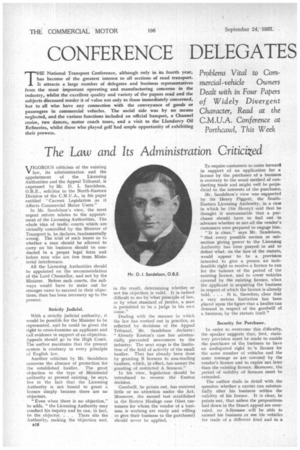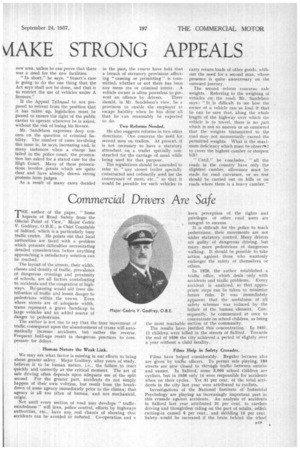The Law and Its Administration Criticized
Page 52

Page 53

If you've noticed an error in this article please click here to report it so we can fix it.
WIGOROUS criticism of the existing V law, its administration and the appointment of the Licensing Authorities and the Appeal Tribunal, is expressed by Mr. 1). I. Sandelson, 0.B.E., solicitor to the North-Eastern Division of the C.M.U.A., in his paper entitled "Current Legislation as it Affects Commercial Motor Users."
In Mr. Sandelson's view, the most urgent reform relates to the appointment of the Licensing Authorities. The whole. idea of traffic courts which are virtually controlled by the Minister of Transport is, he declares, fundamentally wrong. The trial of such issues as to whether a man should be allowed to carry on his business should be conducted in a proper legal form and before men who are free from Ministerial interference.
All the Licensing Authorities should be appointed on the recommendation of the Lord Chancellor, and not by the Minister. Before such courts, the railways would have to make out far stronger cases to succeed in their objections, than has been necessary up to the present.
Strictly Judicial.
With a strictly judicial authority, it would be possible for the Minister to be represented, and he could be given the right to cross-examine an applicant and call evidence in support of an objection. Appeals should go to the High Court. The author maintains that the present system is contrary to every principle of English law.
Another criticism by Mr. Sandelson concerns the absence of protection for the established haulier. The great objection to the type of Ministerial authority at present existing, he says, lies in the fact that the Licensing Authority is not bound to grant a licence simply because there are no objectors "Even when there is no objection," he adds, "the Licensing Authority may conduct his inquiry and he can, in fact, he the objector. . . . There sits the Authority, making the Objection and, s18 in the result, determining whether or not his objection is valid: It is indeed difficult to see by what principle of law, or by what standard of justice, a man is permitted to be a judge in his own cause."
Dealing with the manner in which the law has worked out in practice, as reflected by decisions of the Appeal Tribunal, Mr. Sandelson declares: " Already Enston's case has substantially, . prevented newcomers to the industry. The next stage is the limitation of the field of activity of the small haulier. That has already been done by granting B licences to non-trading hauliers, which, in effect, has meant the granting of restricted A licences."
In his view, legislation should be introduced to reverse the Easton decision.
Goodwill, he points out, has received little or no attention under the Act. Moreover, the second test established in the Boston Haulage case (that customers for whom the vendor of a business is working are ready and willing to give their business to the purchaser) should never be applied. To require customers to come forward in support of an application for a licence by the purchaser of a business is contrary to the usual method of conducting trade and might well be prejudicial to the interests of the purchaser.
Mr. Sandelson's view was supported by Sir Henry Piggott, the SouthEastern Licensing Authority, in a case in which he (Sir Henry) said that he thought it unreasonable that a purchaser should have to find out in advance whether or not all the vendor's customers were prepared to engage him.
"It is clear," says Mr. Sandelson, "that every possible section or subsection giving power to the Licensing Authority has been prayed in aid to defeat what, on the face of the statute, would appear to be a provision intended to give a person an indefensible right to receive a licence to run for the balance of the period of the existing licence, and to cover vehicles covered by the existing licence, when the applicant is acquiring the business in respect of which the licence is already held. . . . It is, therefore, clear that a very serious limitation has been placed upon the figure that a haulier can demand in respect of the goodwill of a business, by the statute itself."
Security for Purchaser.
In order to overcome this difficulty, the speaker suggests that, first, statutory provision must be made to enable the purchaser of the business to have an undisputed right to 'a licence for the same number of vehicles and the same tonnage as are covered by the vendor's licence and to expire not later than the existing licence. Moreover, the period of validity -of licences must be extended.
The author deals in detail with the question whether a carrier can substantially alter his business within the validity of his licence. It is clear, he points out, that unless the propositions laid down in the Stuart appeal are overruled, no A-licensee will be able to extend his business or use his vehicles for trade of a different kind and in a
new area, unless he can prove that there was a need for the new facilities.
" In short," he says, "Stuart's case is going to do the one thing that the Act says shall not be done, and that is to restrict the use of vehicles under A licences."
If the Appeal Tribunal be not prepared to retreat from the position that it has taken -up, legislation must be passed to ensure the right of the public carrier to operate wherever he is asked, without the risk of losing his licence.
Mr. Sandelson expresses deep concern on the question of criminal liability. The number of cases involving this issue is, he says, increasing and, in many instances when a charge has failed in the police court, the prosecution has asked for a stated case for the High Court. Many of these prosecutions involve points which are quite clear and have already drawn strong protests from judges.
As a result of many cases decided in the past, the courts have held that a breach of statutory provisions affecting "causing or permitting" is committed, whether or not there has been any mens rea or criminal intent. A vehicle owner is often powerless to pre vent an offence by drivers. There should, in Mr. Sandelson's view, be a provision to enable the employer to escape liability when he has done all that he can reasonably he expected to do.
Two Reforms Needed.
He also suggests reforms in two other directions. One concerns the need for second men on trailers. At present, it is not necessary to have a statutory attendant on a trailer specially constructed for the carriage of meat while being used for that purpose.
The regulations should be amended to refer to any closed trailer specially constructed and ordinarily used for the conveyance of meat, etc.," so that it would be possible for such vehicles to carry return loads of other goods, w itit-' out the need for a second man, whose presence is quite unnecessary on the outward journey.
The second reform concerns axle weights. Referring to the weighing of vehicles on the roads Mr. Sandelson says : " It is difficult to see how the owner of a vehicle can so load it that he can be sure that, along the whole length of the highway over which the vehicle is to travel, there is no part which is not so uneven or so cambered that the weights transmitted to the road may not momentarily exceed the permitted weights. What is the maximum deficiency, which must be obsernfi to cover the highest camber or steepest hill?
" Until," he concludes, " all the roads in the country have only the slightest camber, allowance must be made for road curvature, or no test should be carried out on hills or on roads where there is a heavy camber."




























































































